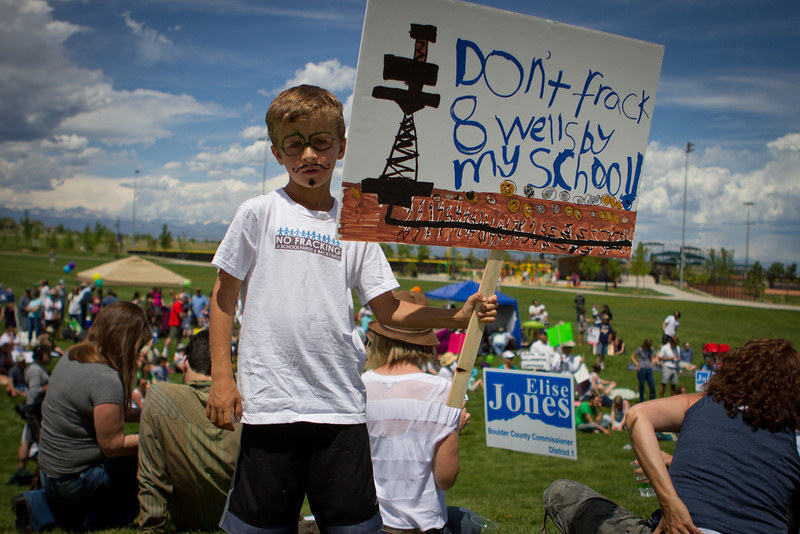This election season, cities in Colorado and Washington are proving to be battlegrounds for community groups pushing to locally restrict oil, gas, and coal development. And in both places, the fossil fuel industry has been pouring hundreds of thousands of dollars into making sure that doesn’t happen.
In Colorado, the drilling boom that accompanied hydraulic fracturing (“fracking”) is coming under increasing scrutiny, especially in the wake of several lethal accidents in frontline communities. On November 7, Broomfield, a large town between Denver and Boulder, will vote on a charter amendment that would require oil and gas development to safeguard the environment and “not adversely impact the health, safety, and welfare of Broomfield’s residents.”
The citizen-initiated charter amendment, Question 301, reiterates a Colorado Court of Appeals ruling from earlier this year, which some say changes the mandate of the state regulatory commission in charge of oil and gas. Following a lawsuit by Colorado teen Xiuhtezcatl Martinez, the court ruled in March that safeguarding public health and the environment was indeed “a condition that must be fulfilled” prior to oil and gas drilling.
This decision was a stark divergence from the Colorado Oil and Gas Conservation Commission’s long-held stance that the commission only had to “balance” health and the environment, with its mandate to facilitate fossil fuel extraction.
A campaign to defeat Broomfield’s charter amendment has received over $344,000 in contributions from the industry. The Colorado Petroleum Council — a local chapter of the American Petroleum Institute — is involved with a suite of campaign activities against it, including phone outreach, direct mailing, polling, data, digital outreach, and online advertising.
Supporters of Question 301, meanwhile, have so far raised about $7,000.
A ‘hit job on my reputation’
Broomfield is also home to city councilor Kevin Kreeger, a critic of drilling in the city and the subject of an apparent smear campaign. As reported in The Colorado Independent, multiple private investigators have been digging into the councilor’s divorce records and trying to associate him with a controversial anti-fracking activist who says that “fracking equals murder.”
One of the investigators, it was revealed, works with an influential D.C.-based firm called Definers, which specializes in “campaign-style opposition research.”
Definers is trying to do a “hit job on my reputation,” Kreeger, who is not up for reelection, told DeSmog.
They do “character assassinations for presidential candidates and U.S. Senate candidates,” he continued. “They are doing extraordinarily horrid things [to try] to silence me.” If the oil and gas industry continues unchecked, he told DeSmog, “we’re going to be polluting our drinking water and harming our kids’ health all for corporate profit. They are mining for natural gas here in Broomfield and selling it to other countries.”
Central to the campaign against Kreeger is the powerful oil and gas trade group Western Energy Alliance, which publishes Western Wire, a platform it describes as “the go-to source for news, commentary and analysis on pro-growth, pro-development policies across the West.” Its approach parallels that of the Richmond Standard, an online outlet entirely produced by Chevron’s public relations team and praised by Koch Industries. (Chevron operates an oil refinery in Richmond, California, which processes 250,000 barrels of oil each day.)
Oil and Coal Trains in the Northwest
At the same time, in the Pacific Northwest, residents of Spokane, Washington, are once again trying to slow the flow of fossil fuel trains through the city. Proposition 2 would fine trains that transport uncovered coal or highly volatile fuel from North Dakota’s Bakken oil and gas fields.
According to the state Public Disclosure Commission, the political committee opposing the initiative has so far raised nearly $265,000. Its top donors are rail giants BNSF and Union Pacific, coal producers Lighthouse Resources and Cloud Peak Energy, and petroleum refiner Tesoro (which this year changed its name to Andeavor).
Proposition 2 is not the first fossil fuel-related ballot measure proposed in Spokane. In 2009, a “Community Bill of Rights” that could have been used to ban trains carrying fossil fuel cargo was proposed and defeated. A different version of that initiative was placed on the 2011 ballot and narrowly lost with 49 percent of the vote.
When a version surfaced again in 2013, legal challenges were filed leading up to the election, culminating in a landmark Washington State Supreme Court decision. The court ruled that because the initiative challenged the state’s supremacy and constitutional protections for private corporations, voters would not be allowed to vote on it. (The initiative proposed elevating the rights of Spokane residents and ecosystems above corporate constitutional rights and the state’s power to unilaterally restrict the powers of localities.) It was taken off the ballot, setting a negative precedent for local ballot measures across the state.
Safer Spokane, the group proposing Proposition 2, had these legal questions in mind when it drafted this year’s initiative. Responding to claims that the proposition exceeds the city’s powers, it argues on its website that, “if [the oil industry] actually believed it was unconstitutional, they would have gone to court to stop Prop-2 from getting on the ballot,” which didn’t happen.
The Spokane and Broomfield initiatives are part of a long line of local attempts to rein in fossil fuel activity in Washington and Colorado. Despite the more measured and mild language in these initiatives — to appease the court system — the amount of money and type of high-powered political tactics the fossil fuel industry is using against them indicates these efforts are hitting a nerve.
Main image: A child holds a sign protesting the development of fracking wells near a school in Colorado in 2012. Credit: Brett Rindt, CC BY 2.0
Subscribe to our newsletter
Stay up to date with DeSmog news and alerts







